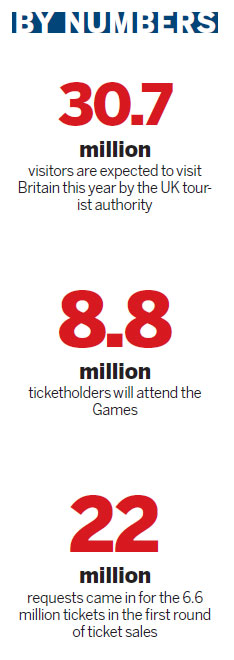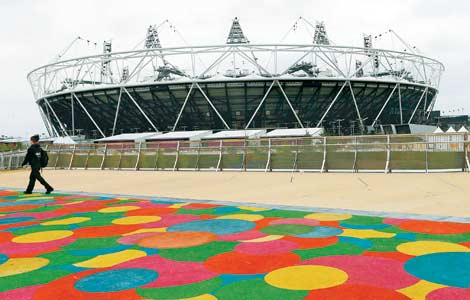London taps into Beijing blueprint
Updated: 2012-05-09 08:02
By Cecily Liu, Zhang Chunyan and D. J. Clark (China Daily)
|
|||||||||||
|
|
Large British delegation garnered information during 2008 Games, but there will still be a 'quirky' feel to this year's Olympics, Cecily Liu, Zhang Chunyan and D. J. Clark report from London
Lessons from Beijing have greatly helped London in its preparations for the Olympic Games this summer, the head of the London 2012 organizing committee told China Daily.
Paul Deighton, chief executive of the London Organizing Committee of the Olympic and Paralympic Games (LOCOG), said that a large London delegation attended the 2008 Games and came back with valuable information.
"For us, really, where we've learnt the most is close to the field of play," Deighton said, "say you're on a hockey pitch, it's pretty much the same in Beijing as it is in London, so you can learn very directly from that."
 |
For this reason, London sent competition managers to work as deputy managers alongside Beijing's own competition managers in 2008, "to really understand how to run the Olympic competition and how to take care of the athletes".
Beijing's Olympics is well remembered for its spectacular opening and closing ceremonies, but Deighton said London would not be as extravagant.
"Every city does it in its own way. Clearly what we're not going to do is to put on something so spectacular in terms of the number of people, and the special effects that could be created," he said.
"We'll just be London," he said, adding that components of Britain's creative industries like music, arts, fashion and the "rather quirky" British humor will all come into play.
The venues where the events will take place in Britain can be broadly divided into three: the Olympic Park, London and outside London.
The Olympic Park will house nine sites. At the center is the Olympic Stadium where athletics and the opening and closing ceremonies will take place. It took three years to construct and there is ongoing debate about what will become of it after the Games. The Aquatics Centre will host swimming, diving, synchronized swimming and the modern pentathlon's swimming.
The velodrome, where Britain hopes to secure a hefty haul of medals, features 250m of track, laid by a team of 26 specialist carpenters. The Copper Box, which will host handball and goalball, a Paralympic sport, has 88 rooftop sun-pipes to allow the field of play to be naturally lit. The 35m high basketball arena has some similarities to Beijing's Water Cube exterior but is only a temporary structure and will be removed after the Games. A brightly-colored hockey arena and a futuristic BMX track will also be inside the park.
London is using a few of its most famous landmarks to provide a backdrop to some of the more public events. Cyclists and marathon runners will finish their long-distance races sprinting down the Mall with Buckingham Palace behind. Hampton Court, the extravagant palace of King Henry VIII, will play host to the time-trail cycling while the beach volleyball will take place at Horse Guards Parade, just behind Whitehall, which leads to Downing Street and the Houses of Parliament. Hyde Park will host the marathon swim and triathlon events while the tennis will take place on the hallowed grass courts of Wimbledon and some of the soccer will be played at Wembley Stadium.
Outside London, sites are spread throughout England, Wales and Scotland from the Lee Valley white water center just 30km north of the Olympic Park to Hamden Park soccer stadium in Glasgow, Scotland. Manchester United's Old Trafford ground is possibly the most well known of the venues outside the capital city.
The Games are also expected to give London a tourism boost. VisitBritain, the UK tourist authority, has forecast 30.7 million visitors will head to Britain this year.
"Coming during the Olympic and Paralympic games is a very exciting time to be in the city. Maybe a little more crowded than normal, but very exciting," Deighton said.
He pointed out that apart from London's standard tourist attractions, there will also be free events during the Games for the public to watch, including the marathons, triathlons and road cycling.
As well, Deighton sees the Olympics as a good opportunity to showcase the city's parks, ranging from the purpose-built Olympic Park to temporary venues including Greenwich Park for the equestrian events and the Horse Guards Parade for beach volleyball.
Demand for tickets for the Games has been phenomenal. In all, 8.8 million ticketholders will attend the Olympics, but even in the first round of ticket sales, about 22 million requests came in for 6.6 million tickets, which ranged in price from about $31 to more than $3,150.
Tickets in China are sold through Caissa International Travel Service, China's authorized official ticket seller. Deighton said that because Britain's domestic demand for tickets was very high, Chinese tourists would have the "best chance" of securing a ticket in China.
Deighton is confident the London Games will be special.
"For me, 2012 is all about the world's greatest sports event coming to what in my mind is the most international city," said Deighton, explaining that the benefits of an international city include a "large indigenous fan base" for every country's team.
"Take as an example, there is a massive Chinese community which lives in London, which will come out to support the Chinese teams, and that's true of virtually all the countries," he said.
Today's Top News
President Xi confident in recovery from quake
H7N9 update: 104 cases, 21 deaths
Telecom workers restore links
Coal mine blast kills 18 in Jilin
Intl scholarship puts China on the map
More bird flu patients discharged
Gold loses sheen, but still a safe bet
US 'turns blind eye to human rights'
Hot Topics
Lunar probe , China growth forecasts, Emission rules get tougher, China seen through 'colored lens', International board,
Editor's Picks

|

|

|

|

|

|






